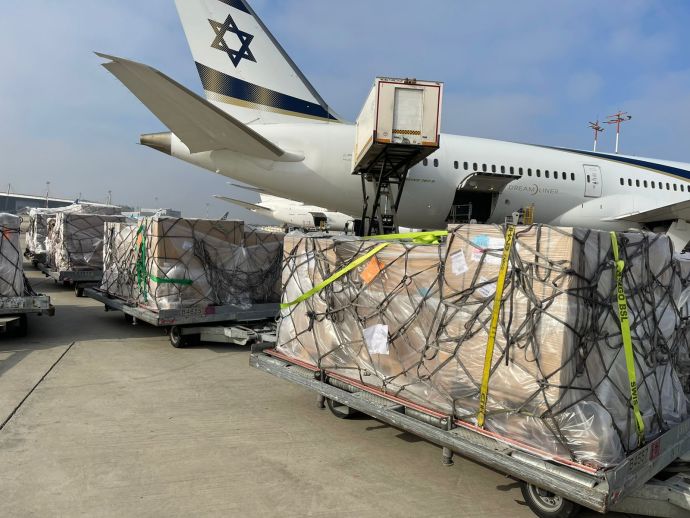Israel must join the international sanctions regime against Russia and allow visa-free entry for refugees fleeing Moscow’s aggression, Ukrainian President Volodymyr Zelensky told students at the Hebrew University of Jerusalem during a special video address on Thursday.
“Unfortunately, we have not yet seen Israel join the sanctions regime,” said Zelensky, whose words were translated from Ukrainian into English. “When governments introduce sanctions against Russia, this is not about money or about business. It is about values and general security. This is about everyone who is willing to destroy another nation [being] held accountable. Japan, Australia and many other countries have joined [the sanctions regime]. Many European countries act together with us against Russian aggression.”
'Not a simple situation'
Sitting next to a Ukrainian flag wearing an olive-colored short sleeve shirt, Zelensky said “We understand that it is not a simple situation for you,” tactically acknowledging Israel’s tenuous situation given that the Russian military is stationed across its northern border in Syria.
However, the situation is no different in Poland, he said, “which is also threatened by Russia. They are providing us with essential logistical support. They hosted 2.5 million people.”
Luxembourg, a country of 600,000 people, has given Ukraine the equivalent of 15% of its defense budget, Zelensky said, noting that Baltic countries have sent weapons.

“How can you not help the victims of such aggression? I asked this question because I know that you do care.”
Ukrainian President Volodymyr Zelensky
“We would like to also get support from your government,” he told the students. Israel has stopped the “visa-free” regime, and that it did so in “these days, now,” said Zelensky.
Ireland, he said, a country with whom Ukraine does not have the same historical and cultural ties that it does with Israel, “even they canceled the visa regime for Ukrainians so they could go there and preserve their lives. Japan and Canada simplified access.”
The Ukrainian president described the conditions that his people were escaping, saying Russian “occupiers” are burying people in collective graves, are “shooting people on the streets, are torturing people. They are raping minors, boys and girls.” Zelensky similarly accused Moscow of creating camps to torture people.
“How can you not help the victims of such aggression?” he said. “I asked this question because I know that you do care.”
At issue is an Interior Ministry cap of 5,000 Ukrainian refugees who may enter the country, an issue that is now before the High Court of Justice. Exceptions can be made for Ukrainian relatives of Israelis who otherwise are ineligible for immigration.
To date, according to the Interior Ministry, 34,403 Ukrainian refugees have entered Israel, of whom 26,000 are eligible for immigration under the Law of Return.
Zelensky thanked Israel for the medication it sent to Ukraine, but noted that it had not received most of the supplies it had requested.
In March, Zelensky virtually addressed the Knesset plenum, speaking of Israel’s role as a mediator between Kyiv and Moscow. This time he did not mention it.
But Zelensky, who is Jewish, did speak of the shared heritage between the two countries, in light of the longtime Jewish presence in Ukraine, and a large number of Israelis of Ukrainian descent: “Please remember how much our cultures are linked, how close our ties are and what the level of understanding should be between us. So why do we have this misunderstanding with some representatives of the government? I do not know.”
Zelensky said that he cared “about the future relations between our state and our people. We do have a joint, great future of great people, because we have this great history and great past. We will have to look into each other’s eyes for many years to come.”
In highlighting Israeli-Ukrainian ties, Zelensky recalled that former prime minister Golda Meir and Jewish playwright Shalom Aleichem were both from Kyiv. He also cited sacred places such as Uman, and memorials to the Ukrainian Jews who were killed by the Nazis. He did not mention the Jews who were killed by Ukrainians.
Zelensky’s address came a day before the four-month anniversary of Russia’s invasion of Ukraine, which has galvanized international support for his country. He noted Ukraine was on the edge of acceptance as an accession candidate to the European Union.
“Soon we will be part of that family, and we have sacrificed a lot for that,” he said.
